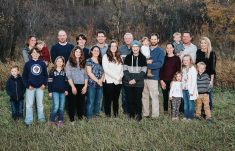A lady whom I have grown to admire was told a few years ago that she was seriously ill with cancer. She chose to deal with her cancer by leaving the battle to the physicians.
Her job was to live as rewarding a life as she could, in whatever time she had remaining. She made sure that her grandchildren got extra hugs when they came for a visit; she spent a few extra moments each morning revelling in the dawn of the day; and she kept extra wood stacked by the fireplace so that she could cherish the warmth of an open fire during a winter’s storm. My friend survived the severity of her illness. She is alive today, and she is as passionate about living as she was when seriously sick. She spends most of her time encouraging others who are as sick as she once was.
Read Also

Ask tough questions to determine if business still works
Across the country, a hard conversation is unfolding. Many producers are starting to ask a tougher question: can we keep doing this the way we always have?
Most of us have seen people go through an experience with cancer. Each person has her own strategy for dealing with it.
Dealing with cancer usually means time away from work, home and family. It means dealing with an unknown force in an unfamiliar place, and with doctors, nurses and technicians who are not well known by the patient. The need for support from family and friends is paramount.
At the same time, support can be elusive. Few of us know what to say or do when someone we know is dealing with cancer. We are at a loss for words. The irony is that we do not have to say much. We just have to be available. Sometimes the less said, the better.
From the statistics I have seen, the medical profession is doing a wonderful job helping people with cancer deal with their illnesses.
Recorded statistics since 1960 show slight to moderate improvements in the treatment results for all forms of cancer.
For some such as breast cancer, Hodgkin’s disease, cancer of the urinary bladder, thyroid and prostate gland, there is continuing improvements in the success of treatment. We have reason for optimism, and even more so, for encouraging our friends and relatives who are dealing with the dreaded disease.
Helping someone with cancer is not difficult. A reassuring smile will do wonders for her disposition, a chuckle or two to break into the beauty of the day.
Listening is important. Who is to say where she will go with it?
This is her opportunity to share with another person all the fear and terror, the tears and loneliness that are haunting her throughout the treatment program.
Perhaps the most significant help we can give someone with cancer is respect, giving her moments of solitude in a moment of pain, while being available to offer support when it is needed.
Jacklin Andrews is a family counsellor who has taught social work at two universities. Mail correspondence in care of Western Producer, Box 2500, Saskatoon, Sask., S7K 2C4 or e-mail jandrews@producer.com.
















